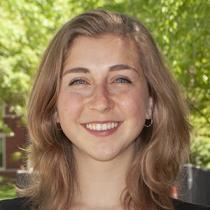
Molly Riebling
After you graduate, what is your next adventure?
The third week in July, I will start my job as engineer in the Redstone Arsenal of the U.S. Army Space and Missile Defense Command in Huntsville.
What about your next adventure are you most looking forward to?
I'm really looking forward to being able to work on a project for a longer period of time. When I interned there, I was restricted to smaller project for a shorter period of time. Now I will be able to dive into longer projects. And I have a couple of friends who are already working there.
Did you have any previous co-op, internship, or research experience in this area?
For the first three years I was at Tech, I worked on the Design Build Fly competitions. This helped me to learn how to approach a project with actual deadlines. With homework, you have to turn it in by a certain time, but that doesn't mean it's completed. With a Design-Build-Fly deadline, if you have not completed your work by the deadline, you will be throwing everyone else's work off. That was new for me, but a great distinction to make. When I was a first-year, I might have thought 'Oh, I'm tired now. I'll go to sleep' but, now, I know that sometimes you have to stay up, to complete the work even if you are tired so that the efforts of others will also succeed.
During my first-year, I applied for a SMART Scholarship, which pays for your education, pays you a stipend, and connects you with a DoD lab. When I learned that I had gotten it, I had already been in talks with the Prox-1 [cubesat] project that Dr. Spencer was working on, so I spent that summer working on circuit-board testing for Prox-1. In the fall, I kept working on the structures team. In the spring, I started working on the final verification of the ADCS [attitude determination control subsystem] for Prox-1. After they shipped Prox-1 off to New Mexico [for an eventual launch], I started a SMART internship in Huntsville. I worked on an antenna that was intended to communicate with a satellite, Kestrel Eye, that they were about to launch. The antenna we built was called WALT - Warfighter Assisting LEO Tracker. It was supposed to be set up on the roof, so there I'd be, on the roof of the building on a hot summer day, dressed in business casual, working on a computer.
Junior year I worked in Dr. Holzinger's lab on Omnissa, another cubesat. I worked on the thermal control subsystem, and, as the only undergrad in the lab at that point, I did general support.
In the summer, I went back to Huntsville where WALT was now 'talking' to Kestrel and downloading images. That summer I worked on thermal vacuum chambers as well as a smallsat testbed for REST -- reliable expandable satellite testbed.
When I returned to Tech last fall, I started working mostly in the Aero Maker Space as a mentor, teaching other students how to use the laser cutter, the 3D printer,and the wood room
How did your educational experience at Georgia Tech help you to achieve your goals?
Internships gave me practice for what the real world would offer, eventually. I was able to use that practice to pursue projects that furthered my own education. I also got a lot out of working in Aero Maker Space as a mentor. As the Space has grown, it's become a place where I've met many of my best friends. And it's an exciting place because people come there to see what they can do with the equipment.
What advice would you give to an underclassman who would like to follow the same path?
I would probably have to say: don't stress so much. Ask for help when you need it. Sleep more. A lot of what you worry about will eventually fall into place. All stress does is make you feel uncertain.
For DBF, I knew I had to keep a deadline, so I had to be able to evaluate the amount of time I would need to do a good job. Then plan to put in the time. With a test, you are going to be a lot better off if you don't stay up all night to study.